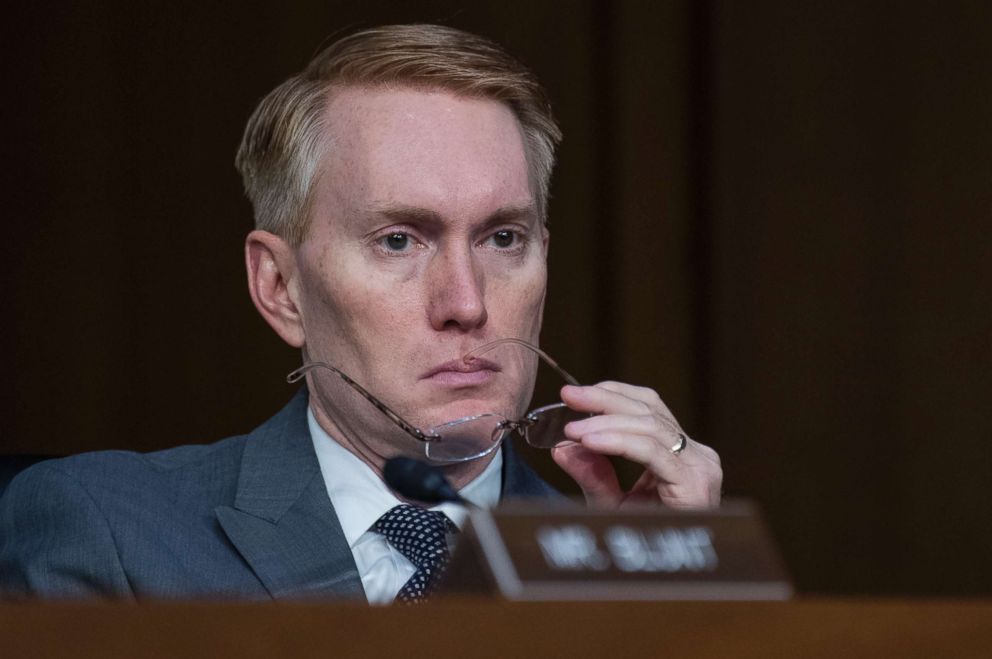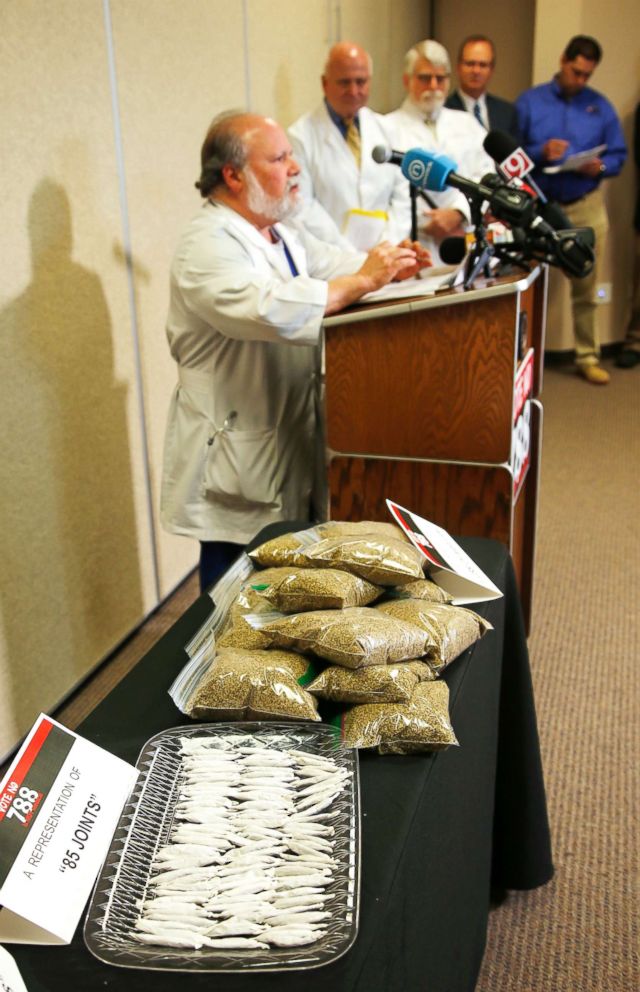For some Christian voters in Oklahoma, medical marijuana is a 'moral issue'
Some Christian voters view it as an immoral step in the wrong direction.
As Oklahoma prepares to vote on medical marijuana legalization next Tuesday, some Christian voters in the deep-red state view the issue as a moral dilemma.
If it passes, State Question 788 would legalize cannabis for medicinal purposes, making the Sooner State the 30th in the nation to do so. But some Christian voters see it as a step in the wrong direction.
“Their intent is to undo the influence of the church in Oklahoma - or ‘unbuckle the bible belt.’ This is why we must vote NO!” Oklahoma Faith Leaders, an anti-marijuana legalization faith group, said of pro-legalization advocates in a June 12 Facebook post.
Oklahoma Faith Leaders is led by a former consultant to GOP Sen. James Lankford, and seeks to “organize the faith community” to “fight for the moral future” of the state, according to its Facebook page. This includes rallying against medical marijuana legalization, which the group says is actually “recreational access to marijuana in disguise.”

Blake Gideon, the pastor of Edmond’s First Baptist Church and a member of Oklahoma Faith Leaders, agrees. He thinks the ballot initiative is “not what it appears to be.”
“This is a deceptive ploy to promote widespread recreational legalization. It’s too broad, and it lacks clarity on who qualifies for a license. There are no guidelines on what illnesses [marijuana] can be prescribed for and what doctors can prescribe it,” he said.
If State Question 788 passes, it would be the first such law in the nation that doesn’t list specific qualifying conditions for which doctors can prescribe medical marijuana for their patients.
“There are no qualifying conditions,” the proposal reads.
“My issue is not with medical marijuana, it’s with State Question 788. Medical officials, the law enforcement community, business leaders, and the faith community have all come together and spoke out against it. It’s not just the faith community,” Gideon said.
Gideon is also concerned that the ballot initiative would contribute to the “moral decay” of Oklahoman communities.
“It would put our neighborhoods, families, and schools at risk for exploitation and crime,” he said, adding that long-term marijuana use “inhibits one’s ability to think clearly” and contributes to “hallucinations, delusions, and psychosis.”
“Is this what we want in our society and culture?” Gideon said. “We must stop the trafficking of addictive, mind-altering drugs into our state.”
Lankford recently joined Oklahoma Faith Leaders in opposing State Question 788.
“Our families won’t be better if more parents and grandparents smoke more marijuana,” he said in a video. Prior to serving in Congress, Lankford served as the Director of Student Ministry at the Baptist Convention of Oklahoma.
But to other faith leaders, marijuana represents an opportunity to alleviate suffering.
“Jesus supported the relief of suffering and pain whenever he could. This is what medical marijuana does in contemporary society,” said Alexander Sharp, a Christian reverend and the director of Clergy for a New Drug Policy, a national faith group that seeks to “end the War on Drugs” and replace the United States’ “culture of punishment” surrounding drug use.
Sharp acknowledges the fear among clergy members that the proposal will be a “segue into recreational legalization.” But to him, this doesn’t justify opposing medical legalization.
“To deny medical marijuana because you’re worried about recreational marijuana is misguided and cruel,” he said, noting that he also “absolutely supports” recreational marijuana legalization.

Unlike Gideon, Sharp believes that legalizing marijuana will contribute to the strengthening of communities, allowing parents to “talk honestly and effectively to kids” about drug use.
“It would promote being honest and open, and you can’t do that under prohibition,” Sharp said. “Legalization means regulation, taxation, and sound education.”
Meanwhile, Bobby Griffith, a Presbyterian minister in Oklahoma City and member of Clergy for a New Drug Policy, said he believes that based on the Scriptures, “enjoying creation" is “governed by moderation, not prohibition.”
“From my perspective, as a Christian minister, the Scriptures point us to the goodness and usefulness of creation. God is pleased and calls the earth and everything in it, very good in the Genesis accounts...with medical marijuana, I believe the same thing applies. It IS a natural product. It is not addictive,” he said in a statement to ABC News.
Griffith said he believes that the axiom “love your neighbor” can be applied to medical marijuana legalization.
“It is a compassionate policy that helps us to best love those who suffer,” he said.
To Sharp, opponents of medical marijuana legalization – in particular, clergy – are “caught up” in “outdated views of sin” based on “literal, if misguided, interpretations of the Bible.”
“They are so focused on personal salvation and so afraid of their own personal concerns,” he said, noting that he believes opponents of legalization fail to focus on preventing drug abuse.
“Jesus would’ve wanted to alleviate suffering. Medical marijuana is an effective response to prescription opioid abuse and has saved lives,” Sharp said.
Griffith agreed, noting that he believes marijuana is “safer than alcohol, and certainly safer than opiates.”
Meanwhile, he said that religious opposition to the proposal is driven by “fear-based moralism that hearkens to the Prohibition movement of the Victorian era.”
“Well-meaning Christians are hard-pressed to biblically justify prohibition of marijuana, or alcohol, for that matter. If it is legalized for medical purposes, the outcome will disprove the arguments that have, essentially, played upon fear to keep it illegal,” he said.
But while faith leaders on both sides hope to alleviate suffering, they disagree on how to do just that.
“I wholeheartedly believe we need to find a way to alleviate suffering, but State Question 788 is not the answer,” Gideon said.
Even if Oklahoma’s ballot initiative were to be revised so that it lays out more specific guidelines for medical marijuana distribution and usage, Gideon isn’t sure how he would respond.
“I can’t say, at this point, what I would do. But if real doctors who went to medical school can prove that [marijuana] alleviates suffering, I would be open-minded,” he said.
Ultimately, Sharp believes that medical marijuana legalization in Oklahoma would be an act of “mercy, compassion, and healing.”
“That’s what our faith teaches us. I can’t see any downsides to [legalization],” he said.
But to Gideon, Christianity, at its core, emphasizes self-control.
“The two hallmarks of the Christian faith are sobriety and self-control,” he said. “Marijuana inhibits both of these hallmarks.”
Next Tuesday, Griffith said he will vote “yes” on State Question 788.
“I am one of the few ministers who has agreed to say that on the record. I have talked to many, many more who will do the same,” he said.
But Griffith is skeptical that the majority of Oklahoma’s faith leaders will follow his lead.
“[Their vote] has more to do with the relationship Evangelicalism and Fundamentalism have with Victorian morality than actually wrestling with the long history of Christian ethics, the texts of Scripture, and how best to love our suffering neighbors,” he said.




